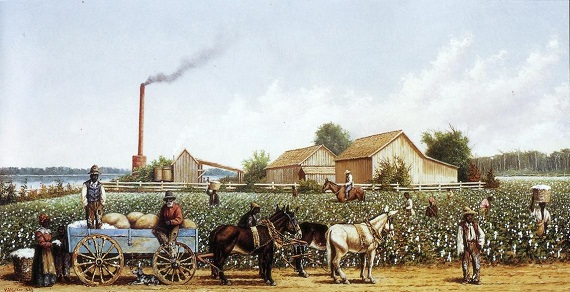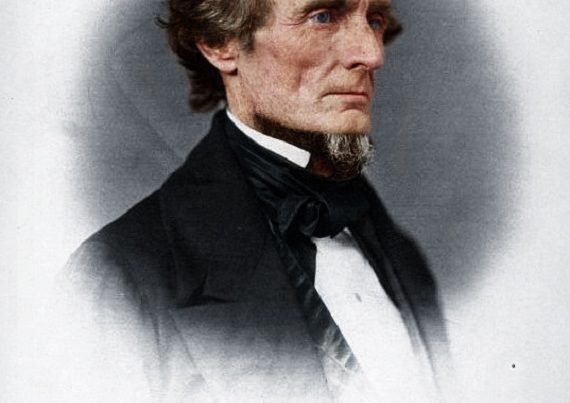Reviewers are unrelenting in their praise for the new Amazon streaming television series The Underground Railroad, a magic realist cinematographic depiction of the eponymous book by Colson Whitehead, which won the 2017 Pulitzer Prize for fiction. A review in ABC News calls the show “a masterpiece that raises series TV to the level of art.” The Washington Post has featured multiple glowing articles lauding the producer and actors for their bravery and brilliance. Another reviewer at Vox-owned Vulture labeled it the “cinematic event of the year.”
The Underground Railroad tells the story of Cora, a run-away slave from Georgia, who is hunted by slave catcher Arnold Ridgeway as she makes her way north, eventually to an independent Black community in Indiana. The show contains some ahistorical, fantastical elements, including an imagined South Carolina town where white citizens control the black community through coerced sterilization and forced drug use (an anachronistic nod to the Tuskegee syphilis experiment). The fictional haven of free blacks in Indiana, in turn, is destroyed and its inhabitants massacred (a further anachronistic presentation of the 1921 Tulsa Race Massacre, or perhaps the 1923 Rosewood massacre).
The program is, obviously, part of a much more expansive trend in American culture and politics, which seeks to foreground the experience of black Americans as heroic survivors of an oppressed racial minority, exemplified in other programs like WGN’s Underground or even the New York Times’s 1619 Project. As one Washington Post article explains, the 10-part Amazon series: “contrasts the moral depravities of subjugation and slavery with the humanity, ingenuity and determination of enslaved people.” It adds, however, that the program is “ultimately less about the torture of slavery and more about the quest for freedom in the face of endless obstacles,” exemplified in the way various black characters are given “more agency.”
There’s that word: agency. When I was an undergraduate studying history at the University of Virginia — and writing my thesis on black religion during the antebellum and Civil War period — that word was central to the books I was assigned to read, the lectures I attended, and the guidance given by my thesis advisor. Black Americans, I was told, had endured narratives that limited their agency and turned them into simplistic, even racist caricatures forced to play scripted parts: the plantation worker grateful to white Northern armies for freeing him; the silent, suffering sharecropper; the subservient black man doing menial labor in the background.
Certainly there was truth to this complaint, and much of the reason for it had to do with unjust, racist caricatures of black Americans with a long historical pedigree. One imagines, however, that larger-than-life, self-assured athletes like Michael Jordan, Bo Jackson, and Ken Griffey Jr.; exceptional leading actors like Sidney Poitier, Denzel Washington, and Morgan Freeman; and brilliant, articulate public intellectuals like Thurgood Marshall, Thomas Sowell, and Dr. Ben Carson have done much to obliterate those stereotypes in the last half-century. Moreover, the miniseries Rootsstarring LeVar Burton — which highlighted the agency of a black slave (and won many Emmys and a Golden Globe) — first aired almost fifty years ago.
Yet with all of the labors by authors, producers, directors, and actors to prove the character, resiliency, and creativity of black Americans, there has been a curious, even injurious byproduct. The experience of antebellum white southerners, and even slaveholders, have not simply been backgrounded. The white southerner has become an absurd caricature, constantly dragged out to play a now predictable and tedious role: the hate-filled, racist, oppressor and master. In stories like The Underground Railroad and other similar recent programs, white southrons in their brutality and hypocrisy are utterly uninteresting. In a word, they have lost their agency.
I do not complain of this development because it marks a new form of oppression — as many critics have noted, savvy white technocrats have often been the beneficiaries of the woke, anti-racist agenda. Rather, as a student (and former teacher) of history, my complaint is of a different quality. Inasmuch as we reduce history to absurd, oversimplified caricatures that serve broader ideological agendas (be it the preservation of the Jim Crow South or the racial reckoning demanded by woke activists), we do a disservice to the men and women of the past, who often are not given the opportunity to speak for themselves. We also act unjustly to ourselves, because we elide the more difficult but necessary work of understanding humanity in all of our complexity and ambiguity as persons capable of great good and terrible evil.
Historians Elizabeth Fox-Genovese and Eugene D. Genovese understood this tension well, manifested perhaps most saliently in their exceptional 2005 work The Mind of the Master Class: History and Faith in the Southern Slaveholders’ Worldview. The Genoveses, who made a remarkable shift from the Left to the Right over the course of their careers, were renowned scholars of the South uninterested in superficial readings of history, and who recognized antebellum white Southerners as “intelligent, honorable, and pious.” The authors note their desire to “avoid two errors: the one that has these white Southerners with nothing much on their minds except slavery, the other that denies the pervasive influence of slavery on their widespread interests.”
Creators of new alt-history content should pay particular attention to the Genovese’s warning that “our culture’s categorial condemnation of slavery has made it easy for ideologues to demonize the slaveholders, even dismissing them, with breathtaking absurdity, as premature Nazis.” The authors ironically describe this move as objectifying historical persons. Indeed, shows like The Underground Railroad aim to paint the antebellum South in distinctly dystopian colors reminiscent of Nazi Germany, or perhaps Westworld. A Washington Post film critic has compared the experience of black Americans in the South to Jews who endured the Holocaust.
A few simple historical facts can demonstrate the absurdity of this analogy. In 1860, there were about 262,000 free blacks living in the South, comprising about 6.5 percent of the entire Southern black population. In North Carolina and Tennessee, free Negro males could vote into the 1830s. Many prominent Southerners, including associate justice of the U.S. Supreme Court John Archibald Campbell of Alabama, and John Randolph of Virginia, freed their slaves.
In the early nineteenth century, anti-slavery groups were common across the South. Before 1830, there were hundreds of such Southern antislavery organizations with thousands of members, which at the time was actually more than in the North. Slave plots or revolts like those of Gabriel Prosser (1800) Denmark Vesey (1822) and Nat Turner (1831) — which provoked understandable terror among many whites — changed all of that. So did inflammatory abolitionist material distributed by mail across the South which urged slave insurrections, inciting the condemnation of antislavery politician John Quincy Adams. (Nat Turner’s rebellion killed 51 whites and perhaps as many as 15 blacks, including many women and children.)
Even after Southern states sought to restrict the freedoms of black slaves because of their fears of violent revolts, prominent Southern intellectuals, particularly theologians, urged reforms to the institution of slavery. This included protecting slave families from forced dissolution (due to sales by their owners), repealing laws against slave literacy, and punishing cruel masters. Some planters, such as James Couper on St. Simon’s Island in Georgia, responded to such warnings by allowing a slave jury system and various levels of slave self-reliance.
Though slaves, expectedly, were suspicious and skeptical of their master’s pretensions, many expressed admiration for the aristocratic ideal their masters projected. White Southerners who actually realized that vision were called “de quality.” Masters, in turn, “jumped at the chance to claim credit for instilling aristocratic values even in benighted slaves.” John Pendelton Kennedy of Maryland described his aging slave Solomon as “an aristocrat of the most uncompromising stamp.” Masters often allowed their black house servants to admit guests, while lowcountry planters relied on black servants to train their children in the “ways of ladies and gentlemen.” Young male slaves were often “hired out to care for and help train younger white boys.”
Some Southerners perceived in John Brown’s raid at Harpers Ferry a form of divine punishment because of various cruelties committed by masters against their slaves. Brown’s raid, said Constance Cary Harrison of Virginia, might be “God’s vengeance for the torture of such as Uncle Tom.” Southern pastors warned their congregations that if they did not live up to Christian standards in their daily lives, including in the way they treated their slaves, a wrathful God would smite His people. Indeed, many Southern religious leaders, even during the years of the Civil War itself, warned of the evils of battle, preaching against the dehumanizing, disastrous aspects of even a just war. Confederate Reverend John Paris in 1864 declared: “War is the scourge of nations. God is no doubt chastising us for our own good.”
One could go on (The Mind of the Master Class is 800 pages), but I think the point is proven. White Southerners were a diverse, complicated lot, spanning many religious, socio-economic, and political opinions. Some were ardent federalists, others eager to secede. Some sought to reform or even slowly end the institution of slavery, others were cruel and avaricious masters. Some were widely-read intellectuals well respected by their contemporaries in the North and Europe, others strident in their traditionalist desire to retain an almost medieval, chivalric way of life. They were, in sum, human. They possessed their own agency that made them all unique persons created in the image of God, struggling to possess and retain the good, and reject the evil, in a world rapidly changing because of the Enlightenment, industrialism, and global trade.
Unfortunately The Underground Railroad, like so many other recent depictions of the antebellum South, is uninterested in those complexities. They, like many writers and producers of another generation, would prefer their characters assume simplified, rote roles that align with whatever ideological message they seek to communicate. Because of that, audiences will continue to be given shallow, predictable stories about the American South that, ironically, serve to engender new prejudices and misperceptions. We still await a television series that does the South, in all of its complex beauty, ugliness, and yes, even agency, true justice.








Nice summary.
First, they came for the socialists…then they came for the trade unionists…then, who did they come for? And why was the third group not the first group? And here I thought they only came for the third group…it is, after all, the only group you hear proclaiming their innocence.
Didn’t the US round up traitors to the cause and put them in camps? What would have happened to those traitors if the US had suffered 24/7 bombing of industry and cities for years? IF the US had lost the war, would it have been able to feed those traitors?
Truth is easy to discern. Your enemies cannot hide truth. They can only hope you are too stupid to understand what is right in front of you.
Go watch FIDDLER ON THE ROOF. There you will find truth.
Negro slavery would not have existed in the New World if it had not existed in Africa. The royal families benefitted…royal families in Africa and Europe.
The former brotherly-disagreement on “who has the real blame for some imagined crime” has turned into a total war because our “disagreeable brothers” who used to run the nation have been replaced by globoccultists. They will drive you into camps if you allow them to do so.